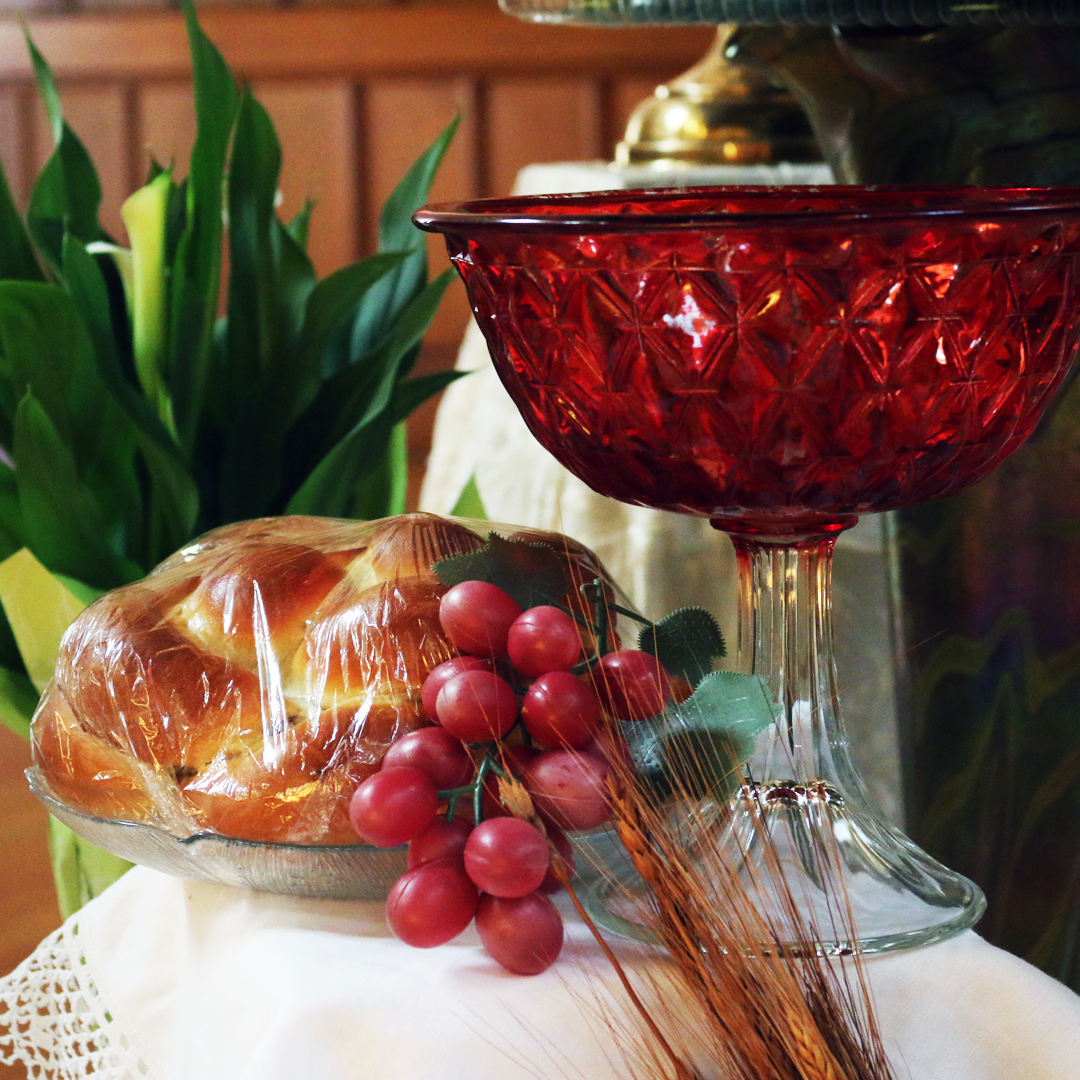Celebrating Hope: Dominic and the Assumption of Mary
Hope. It’s a word we hear a lot - it even became a campaign slogan - but do we really know what it is? It sounds good and on some level, we instinctively want it, but how can we get it? We can learn a lot about hope by looking to our Blessed Mother and our Holy Father Dominic.
Hope. It’s a word we hear a lot - it even became a campaign slogan - but do we really know what it is? It sounds good and on some level, we instinctively want it, but how can we get it? We can learn a lot about hope by looking to our Blessed Mother and our Holy Father Dominic.
Generally speaking, hope is a desire for a good that is difficult to obtain, with the expectation of eventually obtaining it.
As a supernatural virtue, like faith and charity, it is infused in us as a gift of God and by it we long for God and to spend eternity with Him. Hope motivates us to do acts of virtue, to seek God, to love and serve Him with the expectation that He will do what He has promised and grant us eternal happiness with Him. By supernatural faith, we “see” our ultimate target - God - and it is by hope and charity that we fly and soar to the heights.
We can also think of hope with this analogy: picture a toddler who wants to be picked up. They stand in front of their parent, looking up, reaching as high as they can, standing on tip-toe even. No matter how hard they try, they cannot get themselves in their parent’s arms, but they have the expectation that their parent will look down with kindness and lift them the rest of the way. Hope is that desire and expectation, and yet more. Because without God’s gift of hope, we would never look and reach up in the first place.
Our Blessed Mother’s assumption is a lesson in hope.
By this teaching of the Church - that at the time Mary’s life ended on earth, God granted her the privilege of not having to wait until the end of time for the resurrection of her body, but instead her body and soul were assumed into heaven - the glorious triumph of her Son Jesus over sin and death shines all the more brightly. Mary was granted singular graces not because she earned or deserved them, but solely due to God’s lavish gifts of mercy. She was uniquely chosen to walk in unity with the life and her Son, Jesus. And just as His body did not see the corruption of death, so too was Mary’s body preserved from this.
Mary’s assumption teaches us that our hope does not lie in the things of this world - our bodies and souls are destined to a loftier end: heaven.
Materialism, so prevalent in Western culture today, “threatens to extinguish the light of virtue and ruin the lives of men by exciting discord.”
-Pope Pius XII
Munificentissimus Deus
Many monastics and saints have commented that our world would be much more peaceful if the words “mine” and “yours” ceased to exist. So many of today’s arguments, battles, and wars are over material goods that cannot add one moment to our life on earth, nor increase our true happiness. Some of the richest people in the world are also the most miserable. And that is one reason why our Holy Father Dominic urged his sons and daughters to “make your treasure from voluntary poverty.” Actual poverty frees a person from worldly cares because they have nothing to lug around or protect from damage or thieves. “Voluntary” poverty implies more than actual poverty – it requires a detachment of the heart from material goods, a true poverty of spirit. A person can be poor in fact and yet still chained by the desire to possess what they do not have. By choosing to be poor, a person not only renounces actual possession of goods, but also the desire to possess those goods. It is this detachment of the heart that makes it light enough to fly up to God.
Mary’s assumption reaffirms the dignity and beauty of the whole human person - body and soul.
While our ultimate destiny is not this world, we must also remember that God’s creation is good, including our bodies, because that is how God created. Yet, because of sin, “we groan…awaiting the redemption of our bodies.” Because we still labor under the effects of sin, we must discipline our bodies and emotions to put them in right relationship with our intellect and ultimately God. But we should not abuse our bodies – the human person is both body and soul. Our holy Father Dominic began his preaching mission in earnest when he encountered a heresy that denied the goodness of the created world, including the human body. Dominic preached tirelessly against this heresy and spent himself to help provide for the corporal needs of the poor, even to the point of selling all he had, including his books, to help feed starving people during a famine. Dominic also left us the heritage of his “Nine Ways of Prayer”, descriptions of how he prayed using body postures, gestures and his voice to praise God and intercede for others.
Mary’s assumption should stir our hearts to a stronger piety toward our heavenly Mother, and move us with the desire of sharing in the unity of Jesus Christ's Mystical Body.
That is, it should make us more receptive to God’s gift of hope. Because hope is a supernatural virtue, it is a gift. Yet, there are things we can do to make ourselves more receptive to it and to the extent we have it, we should exercise it. In his letter to the Romans, Saint Paul gives us a good place to start:
Therefore, since we have been justified by faith, we have peace with God through our Lord Jesus Christ, through whom we have gained access [by faith] to this grace in which we stand, and we boast in hope of the glory of God.
Not only that, but we even boast of our afflictions, knowing that affliction produces endurance, and endurance, proven character, and proven character, hope, and hope does not disappoint, because the love of God has been poured out into our hearts through the holy Spirit that has been given to us.
- Romans 5:1-5
From this we see that the road of hope passes through affliction. Our Blessed Mother showed us how to walk in this path as she walked it with her Son, for she endured affliction all the way to the foot of the cross on Calvary. And the saints also light this way for us. When things are darkest, that’s when we should look up all the more and wait for the dawn with desire and expectation - God will keep His promises! As the psalmist sings,
Those who sow in tears
will reap with cries of joy.Those who go forth weeping,
carrying sacks of seed,
Will return with cries of joy,
carrying their bundled sheaves.-Psalm 126:5-6
May we increase our love for her who shows her motherly heart to all the members of this august body. And may our Mother Mary and holy Father Dominic intercede for us!
Young Women Gather at the Monastery for our July Come and See Day
Last Saturday, we hosted our July Come-and-See Day, packed with prayer, information on vocations and the life of a Dominican nun, and more! The day began with Mass and Terce (Midmorning Prayer of the Divine Office). The celebrant, homilist and guest speaker for the day was Father David Schunk, STL of the Archdiocese of San Francisco.
Last Saturday, our monastery received a group of young women traveling from different parts of the country to attend our July Come-and-See Day as part of their vocation discernment. The day began with Mass and Terce (Midmorning Prayer of the Divine Office). The celebrant, homilist and guest speaker for the day was Father David Schunk, STL of the Archdiocese of San Francisco.



During his conference following Mass, he spoke about every Christian’s baptismal call to holiness and how religious life deepens that call in a special way. He stressed that discernment begins in relationship with God. “To know your mission, you must know your identity, who you truly are, and you can only know that in relationship with God.” He went on to offer reassurance for those who may not feel “good enough” for a particular calling. “He doesn’t call the qualified - He qualifies the called.” Father Schunk is currently serving as Assistant Vice-Rector and Formation Advisor at the Pontifical North American College in Rome.
The second guest speaker was Brother Patrick Rooney, O.P., student brother of the Western Dominican Province, who spoke on aspects of Dominican spirituality. “Contemplation is a union of mind with God, made possible only by His grace.” He went on, “true happiness is in giving yourself away to another as a gift and holding nothing back.”
Sister Mary Isabel, O.P., our subprioress, spoke to the group about the monastic vocation. “If you remember nothing else from my talk, remember that the monastic life is, at its heart, a calling to profound friendship with God.”
Our Come and See Days offer young women an opportunity to taste a bit of Dominican monastic life. They are planned around the community’s regular schedule of prayer, work/class and recreation. Thus, the young women in attendance experience the ebb and flow of the Divine Office, personal prayer and adoration, as well as recreation with the community and hearing a few of the nuns’ vocation stories.
Our deepest gratitude to Father David Schunk, Brother Patrick Rooney, and to all those who kept us, and the young women in attendance, in prayer. Please continue to offer your prayers for them (and us!) as they continue seeking God's will for their lives. Deo gratias!
Celebrating Corpus Christi Sunday
On Corpus Christi Sunday, Dominican family, friends, and benefactors gathered at the monastery to celebrate with us our patronal feast day. The festivities began with the Holy Sacrifice of the Mass. The principal celebrant and homilist was Father Andrew Opsahl, O.P. Father Andy is one of the newly ordained priests for the Western Dominican Province. He was joined at the altar by many of our Dominican friars, including Bishop Robert Christian, O.P., auxiliary bishop for the Archdiocese of San Francisco, and Father Stephen Maria Lopez, O.P., student master for the Western Dominican Province.
On Corpus Christi Sunday, Dominican family, friends, and benefactors gathered at the monastery to celebrate with us our patronal feast day. The festivities began with the Holy Sacrifice of the Mass. The principal celebrant and homilist was Father Andrew Opsahl, O.P. Father Andy is one of the newly ordained priests for the Western Dominican Province. He was joined at the altar by many of our Dominican friars, including Bishop Robert Christian, O.P., auxiliary bishop for the Archdiocese of San Francisco, and Father Stephen Maria Lopez, O.P., student master for the Western Dominican Province.
Immediately following Mass was a Eucharistic Procession and Benediction. After the beautiful and solemn celebration of the Eucharist, a reception was held in the parlor for everyone. It was a delight and joy to share this special day with all our dear ones. And it is a day that will be particularly poignant in our hearts and minds with the sudden passing of Bishop Robert Christian.
Thank you to everyone who joined us in celebrating and giving thanks for the life, love, and many graces God has poured out on us.


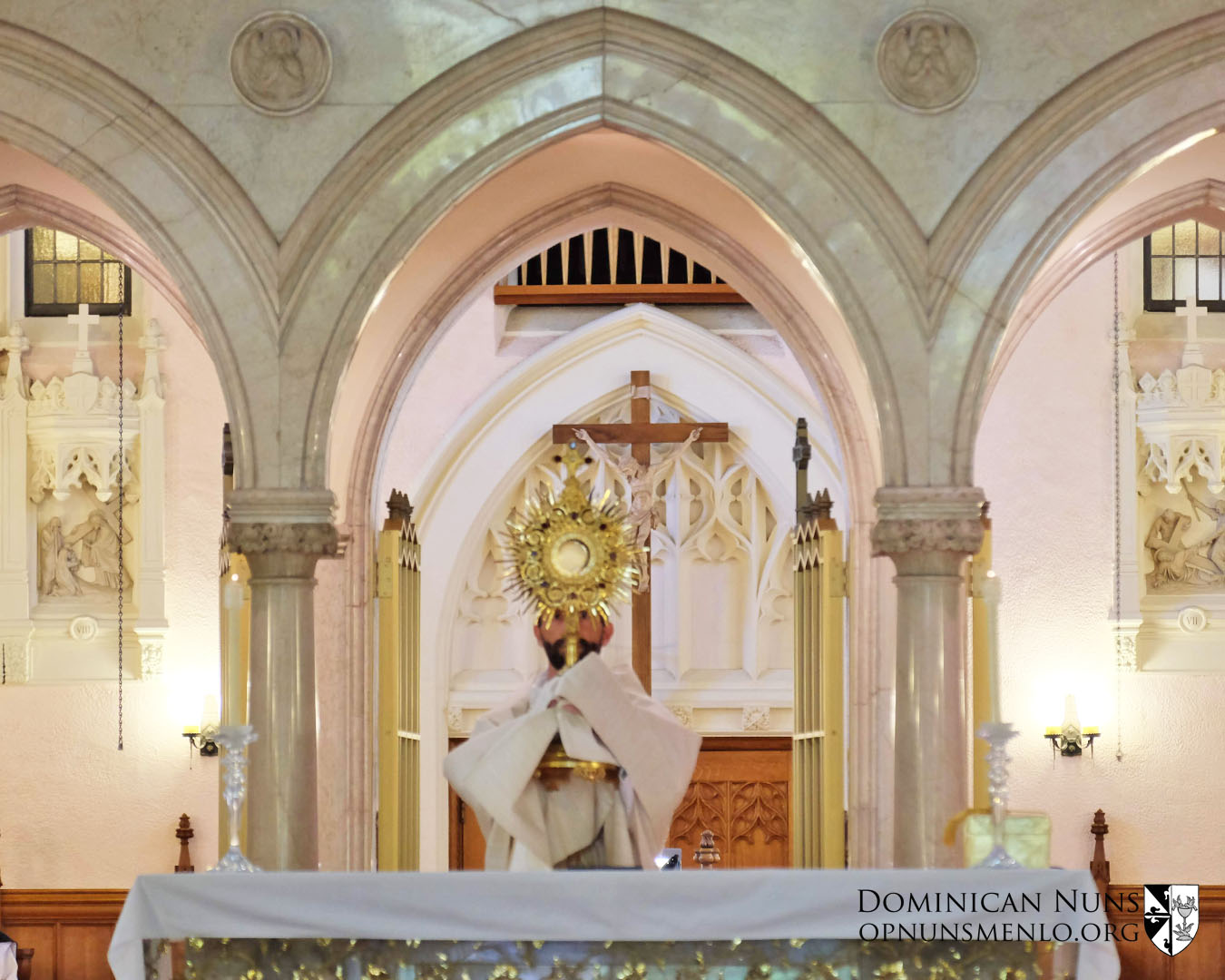
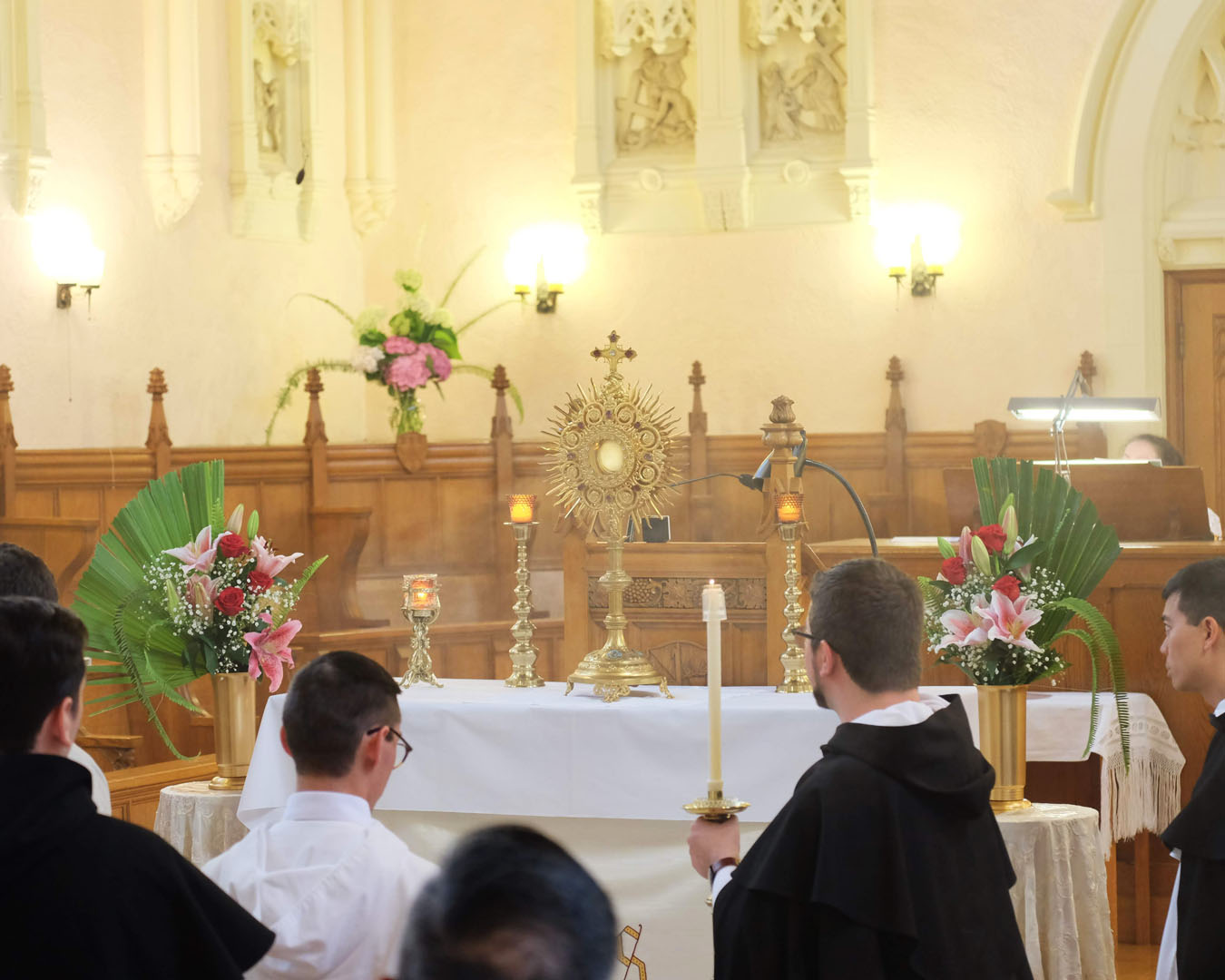
Come Spouse of Christ! Sister André Marie Professes First Vows
June 29th, the Solemnity of Peter and Paul, was warm and bright as our chapel filled with friends and family, here to celebrate Mass and witness Sister André Marie of Divine Mercy make her first profession of vows.
June 29th, the Solemnity of Saints Peter and Paul, was warm and bright as our chapel filled with friends and family, here to celebrate Mass and witness Sister André Marie of Divine Mercy make her first profession of vows. The principal celebrant and homilist was Very Rev. Christopher Fadok, O.P., prior provincial of the Western Dominican Province. The main concelebrants were Rev. Johnpeter Pragasam, Rev. Thuong Nguyen, Rev. Tri Pham, and Rev. Reginald Martin, O.P.
During his homily, Father Christopher tied together the balance and beauty of the life of the Church exemplified in Saints Peter and Paul, with the balance and beauty of discerning and living the contemplative vocation.
“Bishop and missionary. Integrity and creativity. Responsibility and freedom.” Father Christopher said. He went on to say that the Church needs both to strike the right balance and thrive, as do each of us individually. “What does it take to make us stand upright and proclaim the Gospel without falling over? It is a balancing act and creates a sense of tension, but good tension. A tension that brings us joy because we know we are making progress on the way.”
Sister André Marie professed vows in the hands of our prioress Sister Maria Christine of the Cross, O.P. After Father Christopher presented Sister André Marie with the black veil of a professed nun, Sister Maria Christine was assisted by our novice mistress, Sister Joseph Marie of the Child Jesus, O.P. in changing sister’s veil from the novice white to professed black.
Following the Mass, Sister André Marie greeted family and friends in parlor for a joyful and bountiful reception. Deo gratias!
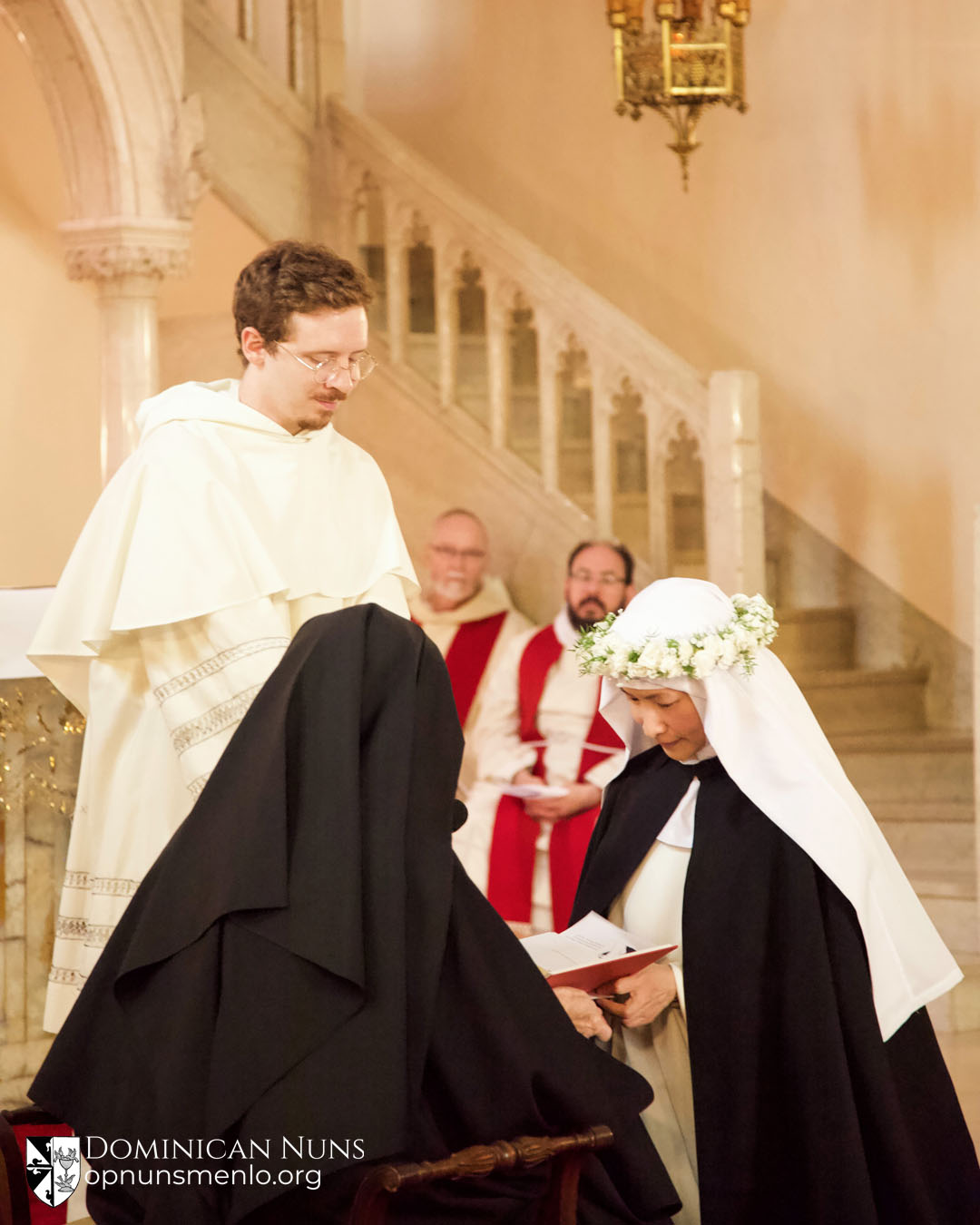
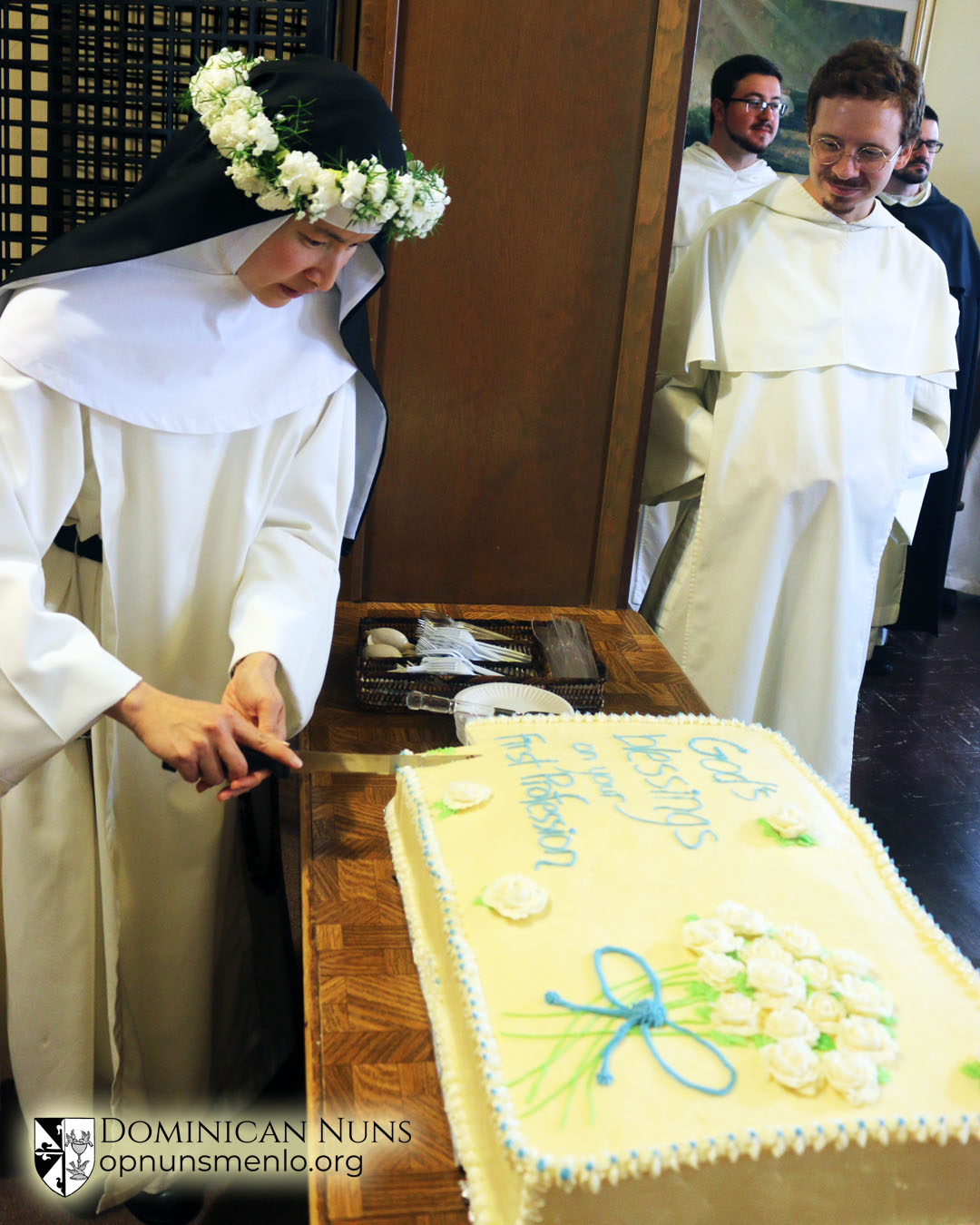
Te Deum laudamus! We Have a Master of the Order!
Over the weekend, the friars gathered at the General Chapter of the Order of Preachers elected a new Master of the Order - Father Gerard Francisco Timoner, III, O.P. of the Dominican Province of the Philippines.
Over the weekend, the friars gathered at the General Chapter of the Order of Preachers elected a new Master of the Order - Father Gerard Francisco Timoner, III, O.P. of the Dominican Province of the Philippines. Father Gerard is the 87th successor to Our Holy Father Dominic and is the first Asian to serve as Master of the Order. In his remarks following his election, he humbly stated his first inclination was to decline, but he was encouraged by former Master Timothy Radcliffe, O.P., and others, to follow the leading of the Holy Spirit .
He went on to say:
The Catholic Church today, it seems, needs a Francis and a Dominic. There is a need for a new evangelization, and we are all called to do precisely that.
Saint Dominic formed an order of preachers. It is not what we do. It is who we are. Mission is not what we do. It is who we are. And if that is clear, everything will just follow. We are preachers even when we are not preaching. We are preachers even if in our old age, we can no longer speak. We are preachers even if we are not ordained. We are preachers even if we are sick. We are preachers even if we are doing serious research alone in our rooms. We are preachers when we are helping the less privileged. We are preachers. That is our identity.
Father Gerard Francisco Timoner, III, O.P. is the 87th successor to Our Holy Father Dominic.
Dominican government is shaped by the communion and universality of Dominican religious life. According to the mind of Our Holy Father Dominic, each member of the Dominican family is to have a participation in the life and government of the community and the Order. As a result, the government of the Order of Preachers is noted for an organic and balanced participation of all its members for pursuing the special end of the Order. But this participation is not strictly democratic - it is communitarian in a special way. We do not simply seek a majority in making decisions - we seek consensus and unanimity under the guidance of the Holy Spirit.
And so, every nine years, Dominicans from around the world gather for the General Chapter of the Dominican Order to settle important matters, including electing the new Master of the Order, who then serves the Order of Preachers as its head for the next nine years. May God bless and protect Father Gerard as he assumes his new role and may God continue to guide our Dominican brothers during the remainder of the General Chapter.
Want more information?
Eight Ways We Go Astray
On the road to God and eternal happiness, there are eight common pitfalls that can trap us and keep us captive. Here’s what they are and how to avoid them.
From the earliest days of Christianity, men and women have gone out into the desert, seeking God and to “bear fruit worthy of repentance.” These Desert Fathers and Mothers are at the foundations of monastic life, and their wisdom and teachings were passed down from one monk and nun to the next. But one man systematized them into some very practical advice for those seeking God. Evagrius described for us “Eight Evil Thoughts” and stated that all our thoughts can be classified into one of these eight. And these thoughts, if left unchecked, keep us from true prayer, lead us away from God and take us down paths were we “do what we don’t want to do and don’t do what we want.” Evagrius and the Desert Fathers knew that the first step to real transformation is to know ourselves – our own thoughts and desires – and only then can we avoid the insanity of doing the same thing again and again, yet expecting different results.
These Eight Thoughts were picked up, further developed and refined by John Cassian, Saint Gregory the Great, Saint Thomas Aquinas and others to become the Capital (or Deadly) Sins many of us are familiar with today. So here’s a quick rundown of the Evagrius’ “Eight” and how to fight them.
Finally, some general remedies:
Suffer from a wandering mind? Regain focus by reading Scripture and spiritual books, spending time at night or in the early morning in silent waiting on God, and pray.
Ablaze with “flames of desire”? Quench earthly desires with fasting, regular manual labor (and/or exercise), and solitude.
Afflicted with irascibility (anger)? Calm the beast within by singing psalms (for example, the Divine Office), practicing patience, and almsgiving or works of mercy.
Of course, we can’t fight any of these without God’s help and grace, so we should always ask Him for it!
98 and Looking Great! (Psst! It's the new floor and pews!)
Today our community celebrates our 98th birthday! It was on this day in 1921 that a small group of intrepid nuns left the cloister walls of their monastery in Hunt’s Point (Bronx), New York and headed west to bring Dominican cloistered life and perpetual adoration of the Blessed Sacrament to San Francisco, California.
A photo of our community from the 1930s. Already it had grown from the very small group of nuns who first arrived in San Francisco in 1921.
Today our community celebrates our 98th birthday! It was on this day in 1921 that a small group of intrepid nuns left the cloister walls of their monastery in Hunt’s Point (Bronx), New York and headed west to bring Dominican cloistered life and perpetual adoration of the Blessed Sacrament to San Francisco, California.
The struggles they faced in establishing the new foundation were immense, but with the prayers and support of the bishop of San Francisco, the friars of the Western Dominican Province, local congregations of Dominican apostolic sisters and many lay men and women, the community found their cleft in the rocks of the West Coast and thrived.
While the area surrounding the monastery has transformed from cattle and farmland into suburbia and tech companies, some things have remained the same: the prayers and support of our Archbishop and local Church, our Dominican brothers and sisters, and the laity, who were are proud to consider our friends and family.




One such friend of the monastery recently reminded us of these ties that remain through time. One day last summer, we received an offer from a gentleman to help us with new flooring and pews in our chapel! His grandfather had attended daily Mass at our monastery, until his death a few years ago. This man, who was born and raised in Menlo Park and saw how many people regularly attend Mass at our monastery on Sundays, decided to offer this project in dedication to his grandparents.
After consideration by the community we gratefully accepted his offer. For one week during November, our public chapel was turned upside down to install the new commercial grade flooring over the old asbestos tile. Then, over Lent, the chapel chairs began to “disappear” as they found new homes. Right before Holy Week, the new pews arrived and were installed. We are so grateful for the generosity of this benefactor and were even more excited that the floor was in before Advent and Christmas and the pews before Holy Week and Easter!
Thank you to all our brothers and sisters, friends and family who support our cloistered Dominican life. Be assured you remain always in our daily thoughts and prayers. Deo gratias!
Harness Your Passion Power!
Our passions are gifts from God and He intended them to be subject to reason. But because of sin and its effects, we must cooperate with God’s grace to discipline them and harness our passion power. So how do we do this? Just remember: A.I.R.-1, 2, 3!
In a previous post, we talked about what our passions are and the purpose they serve us, that they are truly powerful (for good or evil). Our passions are gifts from God and He intended them to be subject to reason, but because of sin and its effects, we must cooperate with God’s grace to discipline them and harness our passion power.
Harness Your Power!
“A person who governs their passions is master of the world. We must either command them or be enslaved by them.” - Saint Dominic
All our passions begin with love, even hate (for example: we hate sickness only because we love health). Our passions are informed by what we’ve taken in with our senses, including our sense of imagination, our environment, our natural temperament and biology, our upbringing and past experiences, and so on. This is easy to see with food examples: we generally like the foods we grew up with and dislike the foods that are foreign to our palate. But what other things trigger our emotions? What buttons or sensitive spots do we have as a result of our temperament or past experiences that trigger anger? Sadness? Joy? Why? Each of these attitudes or way of seeing and perceiving the world around us is unique to each person.
When passions break away…
We each have one or two passions that cause us particular problems and, left undisciplined, will lead us into vice. Love and desire left unchecked can lead us into bad relationships, overeating, overspending, selfishness, and so on. Sadness can leave us depressed and immobile in life. Courage can disintegrate into recklessness. Fear can freeze us from taking risks with our talents so that we bury them. Anger can lead to harsh words or even violence. So how do we harness our power without squelching it? First, pray for God’s grace and guidance. Then, remember AIR.
Assess - where is the heart? When you start to feel your passions rise, or even as you go about the day, pause and ask yourself, “where is my heart?” We can’t harness our passion power until we know which passion is driving us at the moment.
Investigate - why? Once you’ve identified the passion of the moment, ask, Why am I experiencing this passion? What is my perception of the good and/or evil here? What is it that I really love which is at root of this passion I am experiencing at this moment? Remember our passions arise because we first perceive something as good or evil - that perception is inside us and we are ultimately responsible for it.
Respond. Only after steps 1 and 2 are we in a place to respond to the passion. If our passion is reasonable (appropriate for the time and circumstances and in the right measure), we can give thanks! If it’s not, then we need to take measures to keep them disciplined. Our responses will depend on the passion and each person, but here are three alternatives we can try.
Remind ourselves of some aspect of Jesus, Mary or the saints that shows the words, actions or virtue we want to imitate and grow.
Meditate on a mystery of the Rosary or a story from Scriptures that corresponds with the passion. Saint Teresa of Avila used to advise her sisters that if they were sad, particularly for selfish or worldly reasons, and couldn’t shake it, to meditate on Jesus’ agony in the garden and His sadness. The idea is that by giving your passion “new and better food”, it will lose it’s taste for any worldly food and will become more disciplined over time.
Use the passions against one another. This is where the passion of anger is particularly useful, because it is often not compatible with the other passions and can easily summon courage for action. If the passion we are experiencing is leading us to the point of yielding to temptation (perhaps we desire something that would not be healthy or even sinful, or we desire to do nothing when we should do something) or the passion is keeping us from peace and joy in truly good things (for example, we are weighed down by sadness or despair), then we can rouse anger to help dispel the “unruly passion” and spur us on to take any action we may need to take.
The struggle to discipline the passions is hard work, especially at first. But with grace, time and consistent practice, they begin to pull together and in line with reason. Passion Power!
Mary, Our Patroness
Since Jesus told the beloved apostle, “Behold your mother,” at the cross, Christians have gone to Mary, as she is our mother in the order of grace. But Dominicans have a special devotion to Our Lady as she is our Patroness and was instrumental in bringing our Order into existence, sustaining it and causing it to flourish.
Since Jesus told the beloved apostle, “Behold your mother,” at the cross, Christians have gone to Mary, as she is our mother in the order of grace. But Dominicans have a special devotion to Our Lady as she is our Patroness. Blessed Humbert of Romans declared that “the Blessed Virgin was of great help in the beginning of the Order…and it is to be hoped that she will bring it to a good end.” (Opera II< 70-71). From the very beginning of the Order, stories abound of how Mary helped bring our Order into existence and of her continual care and protection of its members. Here is one such story as told by one of the first nuns of the Order, Blessed Cecilia.
How the Blessed Virgin Appeared to [Saint Dominic] in Prayer and Revealed her Protection Over the Order
One night, after prolonging his prayers until midnight, he left the church and came to the dormitory, where he completed what he had come to do and, taking his place at one end of the dormitory, continued to pray. As he stood praying, he glanced at the other end of the dormitory and saw three beautiful women enter, but noticed that the one in the middle was a venerable lady far more beautiful and dignified than the other two. One of them was carrying a beautiful, shining vessel and the other an aspersorium which she handed to the lady in the center, who went from bed to bed sprinkling the brethren with holy water and blessing them.
The lady said to Blessed Dominic: “I am the one you call upon in the evening. When you say, ‘Turn therefore most gracious advocate thine eyes of mercy toward us,’ I prostrate myself before my Son and ask him to preserve this Order.” After this she continued to sprinkle and bless all the others and then disappeared.
When she was gone Blessed Dominic returned to pray in the place he stood before. Suddenly, he was rapt in spirit before God and saw Our Lord and the Blessed Virgin sitting at His right. It seemed to Blessed Dominic that Our Lady was wearing a cape of bright blue, the color of sapphire. As Blessed Dominic looked around, he could see religious of all the orders but his own around the throne of God, so that he began to weep bitterly and stood far away, not daring to approach the Lord and His mother.
Then Our Lady motioned for him to come near. But he would not dare, until Our Lord Himself also called him. Then Blessed Dominic cast himself before them weeping bitterly. But Our Lord told him to rise, and when he did, Our Lord asked him, “Why are you weeping so?” “I am weeping because I see all the other orders here but no sign of my own.” And the Lord said to him, “Do you want to see your Order?” And he answered, “Yes, Lord.”
Then Our Lord, putting his hand upon the shoulder of the Blessed Virgin, said to Blessed Dominic, “I have entrusted your Order to my Mother.” Then he asked him again, “Do you still wish to see your Order?” And against he answered, “Yes, Lord.” Then the Blessed Virgin opened the cape which covered her and spread it out before Blessed Dominic, to whom it seemed vast enough to cover the entire heaven and, under it, he saw a large multitude of the brethren. Then, prostrating himself, Blessed Dominic gave thanks to God and to Blessed Mary His Mother.
Detail from an altar card illuminated by the Dominican nuns of our monastery.
Go to Joseph!
This is the advice given by many saints, and Dominicans are no exception.
This is the advice given by many saints, and Dominicans are no exception. The Dominicans began invoking Saint Joseph in the Litany of the Saints before he was added to the Litany according to the Roman. The sixty-third Master of the Order, Father Jandel, often recommended to the friars devotion to Saint Joseph.
Saint Joseph assists the young Dominican novice to imitate the simplicity and docility of the Infant Jesus. For those who are devoted to the Holy Rosary, he obtains knowledge and love of the mysteries of Mary. Those engaged in work, labor with more courage under the eye and by the example of Saint Joseph. Those engaged in study can better sanctify in his sweet company the hours spent; the apostle, called to go into the world, carries there the same blessings which the Holy Family, with Saint Joseph for guide, carried into Egypt. The dying sanctify under this holy patronage their last hours, and obtain a more peaceful end and after death received more abundant prayers.
It was in order to obtain these more fervent suffrages that the holy brother Joseph de Rueda every night when the bell rang for the prayers for the dead, went and sprinkled the graves with holy water, and then the cells of the prior and the brethren, in the hope that all would recite more devoutly the prayers for the dead. And in our community, one of our devotions to Saint Joseph is to pray his memorare each evening after Supper.
Saint Joseph, pray for us!
Based on an excerpt from Saints and Saintly Dominicans, edited by Rev. Thomas a Kempis Reilly, O.P. (John Murphy Company, 1915).










